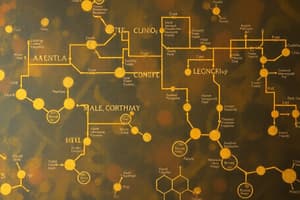Podcast
Questions and Answers
What is the role of DNA in determining an organism's inherited traits?
What is the role of DNA in determining an organism's inherited traits?
Which field of study explores changes in gene expression without altering the DNA sequence?
Which field of study explores changes in gene expression without altering the DNA sequence?
What is the primary function of metabolism in living cells?
What is the primary function of metabolism in living cells?
How do signaling molecules like hormones contribute to homeostasis?
How do signaling molecules like hormones contribute to homeostasis?
Signup and view all the answers
What do neurotransmitters facilitate in living organisms?
What do neurotransmitters facilitate in living organisms?
Signup and view all the answers
How does biochemistry contribute to understanding nature's complexity?
How does biochemistry contribute to understanding nature's complexity?
Signup and view all the answers
What type of biomolecules are proteins, nucleic acids like DNA and RNA, carbohydrates, and lipids?
What type of biomolecules are proteins, nucleic acids like DNA and RNA, carbohydrates, and lipids?
Signup and view all the answers
What is the main role of enzymes in living systems?
What is the main role of enzymes in living systems?
Signup and view all the answers
Which process generates ATP from sunlight through light-driven electron transfer reactions?
Which process generates ATP from sunlight through light-driven electron transfer reactions?
Signup and view all the answers
What would happen to essential bodily activities like digestion without enzymes?
What would happen to essential bodily activities like digestion without enzymes?
Signup and view all the answers
Which molecule is the primary source of energy for living organisms?
Which molecule is the primary source of energy for living organisms?
Signup and view all the answers
What do biomolecules undergo that drive cellular functions?
What do biomolecules undergo that drive cellular functions?
Signup and view all the answers
Study Notes
Diving into Biochemistry's Wonders within Chemistry
Biochemistry is a fascinating field where chemistry meets life at its most fundamental level – the molecules inside living organisms. By exploring this unique intersection of science, we gain insights into how cells function, transform, and interact with each other. Let's delve deeper into biochemistry by examining some core concepts.
Molecular Basis of Life
Life, at its heart, consists of intricate molecular structures and interactions. Proteins, nucleic acids like DNA and RNA, carbohydrates, lipids, and many more chemical entities play vital roles in biological processes. These molecules, often referred to as biomolecules, undergo complex reactions and form elaborate networks driving cellular functions.
Enzymes as Catalysts
Enzymes, proteins specializing in catalysis, accelerate almost all metabolic reactions occurring in living systems. They do so by lowering activation energies required for these reactions, allowing them to proceed at rates compatible with organism survival. Without enzymes, essential bodily activities such as digestion would be sluggish.
Energy Transformations
In biological systems, energy transformation plays a crucial role. Photosynthesis generates ATP from sunlight through a series of light-driven electron transfer reactions. Conversely, during cellular respiration, ATP - the primary source of energy for living organisms - is synthesized from glucose via aerobic or anaerobic pathways.
Genetics and Epigenetics
Genetic information stored in the form of deoxyribonucleic acid (DNA) determines each organism's inherited traits. DNA molecules carry genetic instructions used in protein synthesis via ribonucleic acid (RNA), which also acts as a messenger between the genome and the rest of the cell. Additionally, epigenetics explores changes in gene expression without altering the underlying DNA sequence, shaping an individual's phenotype in response to environmental factors.
Metabolism
Metabolism refers to the set of chemical reactions taking place in living cells to maintain life. This process involves building up biomolecules needed for growth and repair, breaking down nutrients to release their chemical potential energy, and removing waste products. Understanding metabolism provides insights into dietary requirements and the regulation of energy levels in various physiological conditions.
Homeostasis, Signalization, and Communication
Living organisms strive to keep internal environments constant despite external fluctuations, a concept known as homeostasis. To achieve homeostasis, signaling molecules called hormones regulate specific cellular functions, while neurotransmitters facilitate communication among neurons. These signals ensure coordinated responses to changing circumstances.
As you can see, biochemistry unearths secrets hidden deep within our bodies and sheds light on countless mysteries yet to be unraveled. Whether studying hereditary diseases or designing novel medications, biochemists continue to push back the frontiers of knowledge, revealing new applications, and demonstrating the vast potential of chemistry in understanding nature's wondrous complexity.
Studying That Suits You
Use AI to generate personalized quizzes and flashcards to suit your learning preferences.
Description
Dive into the world of biochemistry where chemistry and biology intersect at the molecular level, uncovering the essential components and processes that drive life. This quiz delves into core concepts like biomolecules, enzymes, energy transformations, genetics, metabolism, and cellular communication.




